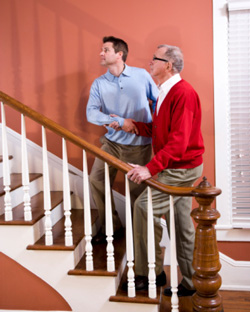It's a New Day in Public Health.
The Florida Department of Health works to protect, promote, and improve the health of all people in Florida through integrated state, county, and community efforts.
Preventing Falls in Florida’s Older Adults
October 02, 2013

Slips, trips and stumbles are potential hazards for us all, but for older adults, they can be especially dangerous. According to the U.S. Centers for Disease Control and Prevention (CDC), falls are the leading cause of hospital admissions and injury deaths for individuals age 65 or older in the United States each year. This holds true in Florida ,where 2,016 Florida residents age 65 and older died by an accidental fall in 2011, with an additional 45,280 hospitalizations for non-fatal injuries.
The natural process of aging can bring on a variety of factors that affect a person’s balance and mobility. Impaired vision, muscle weakness, arthritis or other chronic conditions as well as the side-effects of medications can impact an older adult’s ability to perform daily tasks. The common items and activities of younger years often become potential safety hazards. For older adults who want to continue living independently as they age, these safety hazards can pose a serious obstacle.
The ability to live independently is vital to many of Florida’s older adults and unless their health keeps them from doing so, many would prefer to “age in place.”
The CDC defines aging in place as “the ability to live in one’s home and community safely, independently, and comfortably, regardless of age, income or ability level.”
Here are some important questions to consider if you or a loved one is considering aging in place.
Is your home environment a safe, accessible, functional and comfortable space?
Some of the most common fall hazards for older adults are in their homes:
- Protruding furniture
- Unsecured rugs
- Wires and electric cords
- Items on the stairs or walkway
- Dimly lit areas
- Unstable stepstools and other climbing devices
- Tears in the carpet
- Broken or uneven paths or steps
- Slick floors and bathing areas
What you can do to prevent home falls hazards:
- Check for adequate lighting, clear and level walkways, handrails, and non-slip surfaces.
- Consult the Florida Department of Elder Affairs SAFE Homes program which provides older homeowners with home-related safety tips and information to help them assess and modify their homes for secure, mobile accessibility and comfort as they age.
Do you have any health conditions that put you at greater risk for falls?
Some of the most common health related fall hazards include:
- Impaired vision
- Loss of hearing
- Medications
- Chronic conditions
- Inactivity
- Past history of falls
What you can do to prevent health fall hazards:
- Review all medications and health supplements you are currently taking with your doctor for possible fall risks.
- Receive annual eye exams and hearing exams to update your glasses or hearing assistive devices.
- Evaluate any chronic conditions that may affect your mobility and reduce feeling or sensation that may put you at a greater risk for falls.
- Begin a regular exercise program such as Tai Chi, Yoga, or other balance and strength training programs to improve leg strength and balance.
- Wear sensible shoes that provide a proper fit, grip, and foundation; and avoid high heels, flip flops, and socks without grips.
Please see these additional resources for helpful information:
- Florida Department of Health Older Adult Falls Prevention Program
- Florida Department of Elder Affairs SAFE Homes Program:
Contact: Buddy Cloud at Cloudw@elderaffairs.org or (850) 414-2123. - Florida Department of Elder Affairs Falls Prevention Initiative
- CDC: Falls Among Older Adults




Connect with DOH